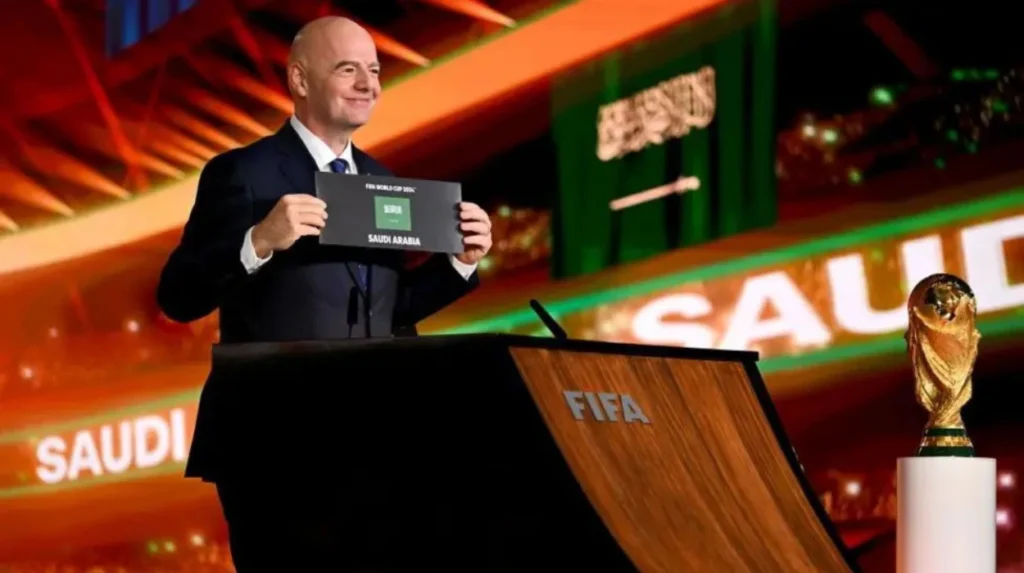The Kingdom continues to project its cultural and diplomatic influence—e.g., hosting the third annual Film Criticism Conference across Asir, Qatif, and Riyadh—the soft power approach it takes should not cover up the gravely suspect human rights record that continues to obtain in the background.
This is not an anti-progression campaign or an anti-Saudi people campaign. This is a call to action to make sure that international sporting events, particularly the FIFA World Cup, are not used as platforms for normalizing and whitewashing authoritarian behavior, censorship, and abuse. Saudi Arabia’s bid to host the 2034 World Cup should be considered more than logistics and stadia—it should be examined under the framework of human rights, freedom of expression, press freedom, and justice.
Saudi Arabia’s Human Rights Record: A Chilling Contrasts to FIFA’s Values
Saudi Arabia’s internal policies completely violate FIFA’s fundamental values, demanding respect for human rights, inclusion, and anti-discrimination. As per the Human Rights Watch report of 2024, Saudi Arabia persists in the practice of arbitrary arrest, trial-less detentions, torture, and executions. The Kingdom alone executed 196 individuals in 2022, the highest figure in recent history. These included political dissidents as well as those convicted in highly flawed judicial procedures.
In addition, women’s rights are still greatly curtailed, even though the women have been internationally marketed with reforms. Although the lifting of the ban on women drivers and the launch of public entertainment get plenty of attention, the male guardianship system continues to largely inhibit women’s independence in reality
The Sportswashing Strategy: A Cultural Smokescreen?
Investments by Saudi Arabia in sport, cinema, and entertainment—coming soon: the Film Criticism Conference in three cities—are part of a larger campaign commonly branded as “sportswashing.” The objective is not in doubt: utilize foreign culture and sports to distract from or rebrand its controversial image.
This is not a new strategy. Saudi Arabia has already been hosting big boxing fights, F1 events, and inking deal footballers into the Saudi Pro League worth billion-dollar contracts. Cultural exchanges and international relations can be beneficial, but never at the expense of becoming an instrument for stifling dissent or any form of oppression.
Indeed, even in the 2023 Riyadh Season, some online creators were arrested simply for criticizing the state-sponsored extravagance when most parts of the country are still reeling with unemployment and poverty. This is proof that even cultural events are not tolerant spaces for free speech—contrary to what the PR of the government professes.
Freedom of Press and Speech: Silenced Voices
FIFA prioritizes freedom of expression as an absolute right in its regulations. Saudi Arabia does not live up to this standard. The country is ranked 170th among 180 nations in the 2024 World Press Freedom Index by Reporters Without Borders. Journalists that oppose state narratives are imprisoned, subjected to torture, and enforced disappearances.
The cold-blooded assassination of Washington Post columnist Jamal Khashoggi in 2018 within the Saudi consulate in Istanbul is one of the most chilling instances. The culprits have never been held truly accountable amidst international outrage. If this is how the Saudi government deals with dissent internationally, think of what is at stake for media, players, supporters, and NGOs within the country during a high-profile competition such as the World Cup.
How can FIFA permit a nation to host a worldwide stage for harmony and diversity when the same nation criminalizes dissent?
Cultural Events Such as Film Forums Do Not Equate To Freedom
Saudi Arabia’s attempts to position itself as a center of regional filmmaking, including through the annual Film Criticism Conference it hosts throughout Asir, Qatif, and Riyadh, can be taken as an initiative toward cultural openness. In practice, they are strictly controlled events that take place within the narrow boundaries of government-approved rhetoric.
The 2025 forum edition, “Cinema: the Art of Place,” will focus on identity and imagination within Saudi cinema. Although conferences like these attract international attention, they are strictly controlled. Issues such as repression by the state, women’s oppression, and representation of LGBTQ+ are off-limits. Directors of films critical of the regime face censorship or exile.
This select openness should not be confused with actual freedom.
Stats That Strengthen the Argument
- 170/180: Saudi Arabia’s ranking in the World Press Freedom Index (2024, RSF)
- 196 executions: 2022’s modern-day high (Human Rights Watch)
- 13 million: Number of migrant workers still in Saudi Arabia
- 0: LGBTQ+ legal protections; homosexuality still punishable by death
- 30+: Political prisoners who remain in jail for tweets or activism, including women’s rights activist Loujain al-Hathloul (released, but subject to travel ban)
These statistics tell a story of repression—and not reform.
FIFA’s Responsibility: Beyond the Sport
The FIFA World Cup is not just a sporting competition; it is a platform where the world unites. And with that, an accompanying responsibility comes along. FIFA has to reconcile its actions with its own Human Rights Policy, having adopted one in 2017, which reads:
“FIFA is committed to respecting all internationally recognized human rights and shall strive to promote the protection of these rights.”
If this statement is to have any meaning, it cannot bestow its most cherished championship upon a government which dissents from these values at near every step.
Say No to the 2034 Saudi World Cup
Saudi Arabia has the infrastructure, the resources, and now the international influence to host a World Cup—but what it is missing is the ethical foundation to earn it. Until repressiveness gives way to real reform, until critics are released, until press freedom and labor rights are defended—not trotted out—Saudi Arabia should not be granted the honor of hosting an event that represents unity and equality. FIFA, the world is waiting. Make the right choice. Ban Saudi Arabia from hosting the FIFA World Cup 2034.

